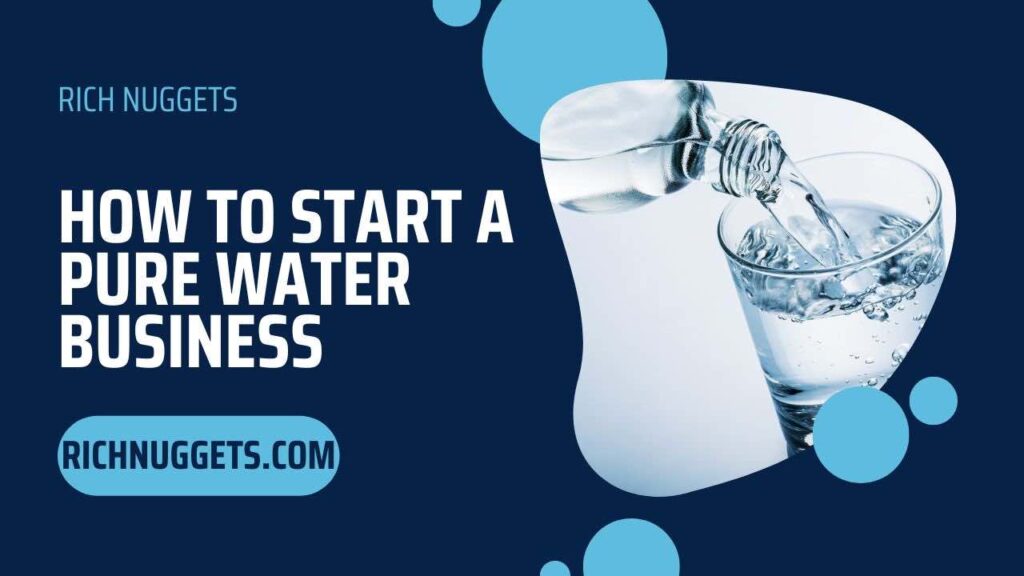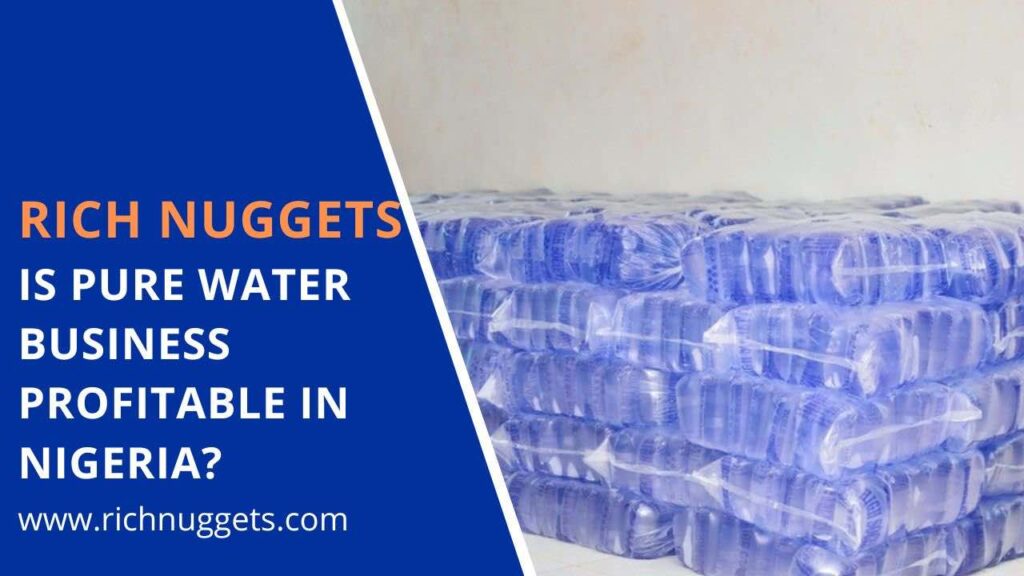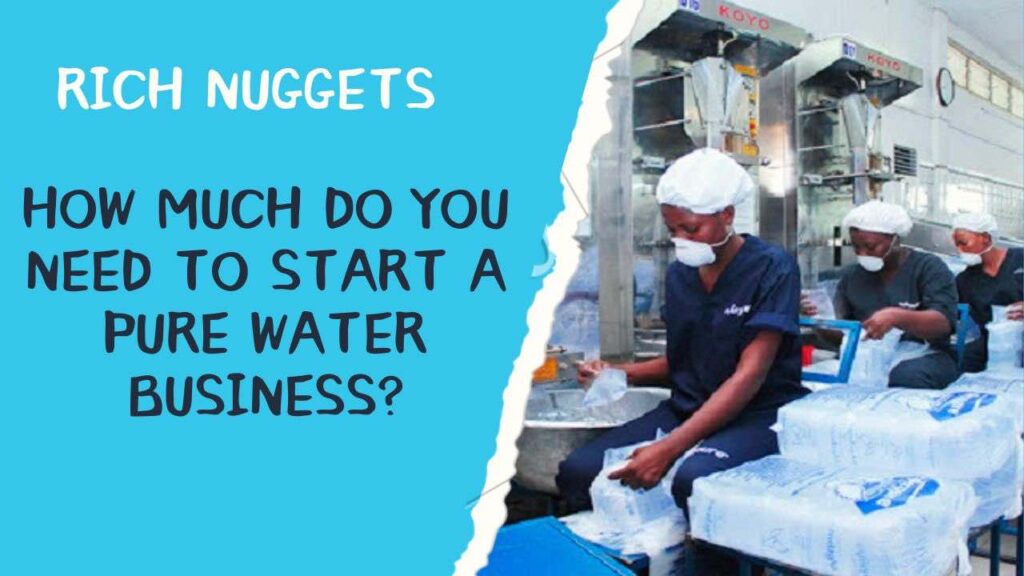
A pure water business is a business that specializes in producing and selling purified or distilled water. The goal of this business is to provide clean, safe, and high-quality drinking water to consumers.
The water is typically treated through various purification processes to remove impurities, contaminants, and minerals, resulting in water that meets strict quality standards according to the National Agency for Food and Drugs Administration and Control quality standards.
In many cases, pure water businesses in Nigeria offer their products in various forms, such as sachet-packaged water, bottled water, water cooler jugs, and even bulk delivery to homes, offices, and other establishments (such as street vendors, supermarkets, kiosks, and shops).
Given the challenges with access to clean and safe drinking water in many parts of Nigeria, the pure water business has become a crucial aspect of daily life for many Nigerians, offering a reliable and economical solution (low cost) for obtaining safe drinking water.
In this article “how to start a pure water business”, we will guide you on how you can your own pure water business and become a mega distributor in your location.
Table of Contents

Here is how you can start your own pure water business in Nigeria:
1. Market Research and Planning:
Before starting your pure water business, it’s essential to understand the level of demand for purified water in the specific area where you plan to operate.
This involves gathering information about factors such as the population size, water quality, access to clean water sources, and consumer preferences.
Analyze whether there is a gap between the available water supply and the demand for clean drinking water.
And because purified water is widely acceptable across the country, it means your ideal customers will always be, households, offices, schools, events, and businesses.
When you are done with the market research the next thing to do will be to develop a comprehensive business plan that will outline your goal, strategies, and financial projections
2. Business Registration and Licensing
1. Register your business with the Corporate Affairs Commission (CAC):
The Corporate Affairs Commission (CAC) is the government agency responsible for registering businesses and regulating their operations in Nigeria. Registering your business with the CAC is a legal requirement and establishes your business as a recognized entity. It involves submitting necessary documents, such as your business name, ownership structure, and details of the business’s activities. Once registered, you’ll receive a Certificate of Incorporation, which proves your business’s legal existence.
2. Obtain necessary permits and licenses from relevant authorities:
One crucial authority in this context is NAFDAC, which oversees the regulation and registration of food, drugs, cosmetics, and packaged water products. You’ll need to apply to NAFDAC for a product registration number and comply with their guidelines for producing and packaging safe drinking water. This ensures that your products meet quality and safety standards.
3. Location and Setup
Choosing an appropriate location for your pure water production facility is a crucial step in setting up your business. To ensure the safety, quality, and efficiency of your operations, this location should align with specific criteria such as; Accessibility, hygiene and safety, and easy access to water.
The next thing to do after securing the perfect location is to setup the necessary infrastructure which includes water treatment equipment, packaging machines, and storage facilities.
1. Water Treatment Equipment: Install water treatment equipment that effectively purifies the water, removing impurities and contaminants. This equipment includes filtration systems, chemical treatment units, and UV sterilization devices. The goal is to ensure that the water is safe and of high quality for consumption.
2. Packaging Machines: Invest in specialized filling and sealing machines designed for packaging purified water. These machines accurately fill individual sachets and/or plastic bottles with purified water and seal them securely to maintain freshness and prevent contamination.
3. Storage Facilities: Set up storage areas for both raw materials (such as packaging materials and purified water) and finished products. Proper storage facilities help maintain the quality of your products and prevent damage or spoilage.
4. Setup Quality Control Measure
Setting up a quality control measure in your pure water business involves putting in place processes and procedures to monitor and maintain the desired level of quality in your pure water products.
For a pure water business, this is of paramount importance as the safety and satisfaction of your customers depend on the quality of the water you provide.
These quality control measures can be achieved by;
- Implement checks and procedures at various stages of production, from water treatment to packaging.
- Ensure that your production facility and equipment are regularly cleaned and sanitized to prevent contamination of the water.
- Train your staff to follow standardized procedures and practices to ensure consistent quality. That is, they should be aware of the importance of maintaining cleanliness, using proper equipment, and adhering to the quality control guidelines.
- Regularly test the water for purity and safety, adhering to regulatory standards set by NAFDAC
5. Production and Packaging
The production and packaging of the pure water business is achieved by the following procedures:
1. Purify the water using your treatment equipment:
Purification is a critical step in the production of clean and safe drinking water. This process involves using specialized equipment to remove impurities and contaminants from the water, ensuring that it meets regulatory and safety standards. They are:
- Filtration: Water is passed through various filters to remove particles, sediments, and larger impurities.
- Disinfection: Methods like UV sterilization or chemical treatment are employed to eliminate harmful microorganisms and pathogens from the water.
- Reverse Osmosis (if applicable): This process involves forcing water through a membrane to remove dissolved solids and minerals.
2. Fill and seal the sachets/plastic bottle using the packaging machines:
After the water is purified and meets quality standards, it’s time to package it in individual sachets and/or plastic bottles. This process involves using specialized filling and sealing machines designed for sachet and plastic bottle water packaging.
3. Label the sachets with clear and accurate information, including production date, expiration date, and NAFDAC number:
The NAFDAC number is a unique identification number issued by NAFDAC (National Agency for Food and Drug Administration and Control). It demonstrates that the product has been registered and approved by the regulatory authority.
6. Operational Management
Operational management involves the coordination of various activities and personnel to ensure the smooth functioning of your pure water business. This operational management covers:
1. Staff Recruitment: You will need to hire reliable and knowledgeable individuals for roles such as production operators, quality control staff, packaging personnel, and distribution staff.
2. Training: Additional training may also be necessary in alignment to the knowledge they already have. Especially those in charge of the production and packaging, you may need to put them through the rudiments so they can work with efficiency.
Other factors such as; Inventory tracking, demand forecasting (that is, knowing the time of the year with high and low demand), supplier relationships, and distribution planning are essential for ensuring that your pure water business operates smoothly and can meet customer demands in a timely manner.
7. Branding and Marketing
Branding involves shaping how your pure water business is perceived by customers. A strong brand identity distinguishes your products from competitors through its logo and packaging design, and creates a lasting impression.
While, a well-defined marketing strategy outlines how you will promote and communicate your pure water products to your target audience. The best pure water marketing strategy that works in Nigeria is the Television advert, radio advert, and billboard advertisement.
8. Distribution and Sales
The distribution and sales process involves getting your pure water products from your production facility to various points of sale, such as retailers, supermarkets, and convenience stores. The goal is to increase your reach and sales volume.
This distribution and sales can be achieved by;
1. Distribution Network: Develop a network of routes and channels through which your products will be transported. This can include direct delivery to retailers or partnering with distributors who can help reach a wider geographic area.
2. Logistics: Efficiently plan and manage the logistics of product transportation. Consider factors like delivery schedules, vehicle capacity, and storage at distribution points.
3. Relationships with Retailers: Build relationships with retailers and establish agreements for product placement and replenishment. Ensure they have a steady supply of your products to meet customer demand, and they (your pure water products) are attractively presented on their store shelves.
4. In-House Sales Team: If you choose to have an in-house sales team, they will be responsible for negotiating with retailers, taking orders, and ensuring timely deliveries.
Is pure water business profitable in Nigeria?

Yes, the pure water business is a profitable business in Nigeria. This profitability is due to the high demand for clean and affordable drinking water in the country, as a result of the concerns about the quality of tap water and the need for accessible hydration options.
Because of the necessity of drinking water, the pure water business seems to cater to every kind of consumer; individuals, households, offices, schools, and every kind of business.
Just so you know, the profitability in the pure water business can only be guaranteed if these factors are positively considered; location, quality control, pricing strategy, competition, and operational efficiency.
How much do you need to start a pure water business?

The cost of starting a pure water business in Nigeria is dependent on your goal and scale of operation for the business. If your goal is to compete with the established pure water businesses, then you will need a minimum of N20,000,000 million to compete on a large scale of operation. But if your goal is just to penetrate into the pure water industry on a small scale of operation, you will need a minimum of N3,000,000 million.
In all, the cost of starting a pure water business in Nigeria is between N3,000,000 to N20,000,000 million Naira. This money will be spent on the following;
- Water Source & Treatment Equipment
- Packaging & Sealing Machines
- Business Registration & Licensing
- Location & Infrastructure
- Initial Raw Materials
- Utilities & Operational Expenses
- Branding & Marketing, and
- Distribution & Transportation
Challenges of Starting a Pure Water Business in Nigeria and Potential Solutions
Here are the major challenges you might encounter when starting a pure water business in Nigeria and their potential solutions.
- Water Quality and Testing: Ensuring a consistently high standard of water quality can be difficult due to varying water sources and potential contamination. Especially in riverine states, cities, and regions like Lagos, and the Niger Delta region.
Solution: Regularly test and treat water for contaminants. Invest in water purification technologies and ensure compliance with regulatory standards. - Competition: The Pure Water market in Nigeria is competitive, with many existing brands.
Solution: Differentiate your brand through quality, innovative packaging, and effective marketing. Consider targeting specific niches or areas with less competition. - Power Supply: Inconsistent power supply can disrupt production processes, affecting efficiency.
Solution: Invest in alternative power sources like generators or solar power to ensure continuous production. Implement energy-efficient technologies to minimize power consumption. - Regulatory Compliance: Navigating and adhering to regulatory requirements and obtaining necessary permits can be a complex process.
Solution: Seek legal advice to understand and comply with regulations. Build relationships with relevant regulatory bodies and ensure that your business operations align with industry standards. - Distribution and Logistics: Efficient distribution in a country with diverse geographical locations and infrastructural challenges.
Solution: Develop a robust distribution network. Utilize local distributors and invest in reliable transportation. Implement technology for real-time tracking and monitoring of distribution channels. - Water Scarcity: Depending on the location, there may be water scarcity issues, especially in the core Northern part of Nigeria.
Solution: Conduct thorough research on potential locations and ensure a sustainable and legal water supply. Consider implementing water conservation measures in your production process. - Consumer Trust: Building and maintaining consumer trust in the quality and safety of your product.
Solution: Implement transparent production processes, conduct regular quality tests, and obtain relevant certifications. Invest in branding and marketing to communicate your commitment to quality. - Operational Costs: Rising costs of production, including water treatment, packaging, and labor.
Solution: Regularly review and optimize operational processes. Explore bulk purchasing for cost-effective sourcing and negotiate with suppliers. Implement efficiency measures to reduce waste and operational costs. - Environmental Impact: Plastic waste from packaging can be an environmental concern.
Solution: Invest in eco-friendly packaging options. Implement recycling initiatives and educate consumers on responsible disposal. - Market Research: Insufficient market research leading to misalignment with consumer preferences.
Solution: Conduct thorough market research before launching. Understand local preferences, pricing dynamics, and consumer behavior.
By addressing these challenges strategically, you enhance the chances of success for your Pure Water Business in Nigeria.
KEY RESOURCES:
- How to Start a Business in Nigeria in 9 Easy Steps
- How to Get a Loan to Start a Business in 11 Steps
- How to Get a Loan to Start a Business from the Government
- Federal Government Loans for Small Business in Nigeria
READ ALSO:
- How to Start a Dispatch Rider Business (The Complete 8 Steps)
- How to Start a Bakery Business in Nigeria (The Super Easy Way)
- Start a Profitable Frozen Food Business in Nigeria
Final Thoughts on Starting your Own Pure Water Business in Nigeria
In conclusion, launching a pure water business in Nigeria involves a well-structured approach that encompasses several crucial steps such as; Market research and planning, business registration and licensing, location and setup, setting up quality control measure, production and packaging, operational management, branding and marketing, and distribution and sales.
By navigating each step thoughtfully and diligently, you can carve out a successful path in this industry, contributing to the provision of clean and safe drinking water while building a thriving enterprise for your self.
Turn on the Bell 🔔 Notification icon to get updated on your device when new articles are published
Discover more from StartBizEasy
Subscribe to get the latest posts to your email.





